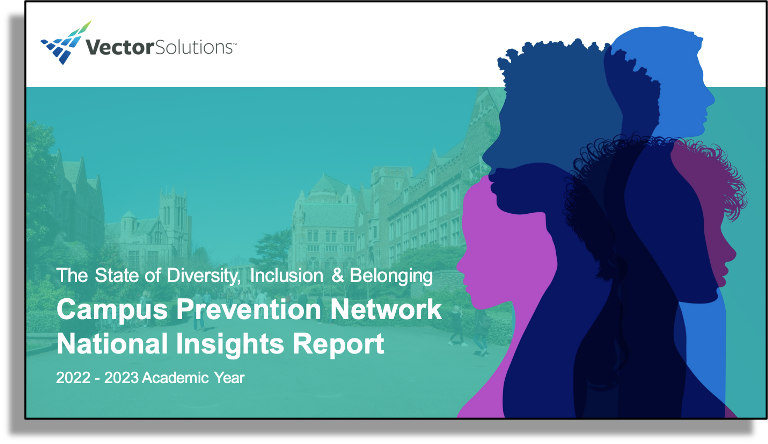September 26, 2023 min read

4 Ways Students can Support Diversity, Inclusion, Equity and Belonging on Campus
Industry:
Solution:

Going to college is often a time of great transition for students. They’re handling the pressures of keeping up with their academics, navigating new social situations and a new environment, and for many, living away from home for the first time. It’s a time when students often work to develop their identity and find their place in the world.
Students in this age group especially, have a strong need for belonging and to find a peer group in which they feel supported and safe. However, too often this doesn’t happen. According to a report by Hanover Research, more than half of college students say they feel excluded based on an aspect of their identity. The Chronicle of Higher Education reports this is amplified for students in underrepresented or marginalized identity groups and that those students are “more likely to arrive on campus already wondering if they belong there.”
Benefits of Diversity, Equity, Inclusion, and Belonging
According to the “Campus Prevention Network – National Insights Report on The State of Diversity, Inclusion & Belonging,” most students are ready to support inclusion and become involved in diversity efforts on campus, but few students are currently engaged. When students feel alone, isolated, or unseen it can have a negative impact on their mental wellness, as well as their academics. Conversely, research has shown that a greater sense of belonging has a positive impact on students’ wellbeing, academic success, and on the likelihood they will stay enrolled in the school.
The State of Diversity, Inclusion, & Belonging in Higher Education
This report shares unique insights from college students across the nation on their experiences and perceptions when it comes to diversity, inclusion, and belonging.
Download Report
What Students Can Do
While it’s important for administrators and staff members to understand and reinforce DEIB strategies, practices, and policies, students can also take an active role in helping to support and promote DEIB on campus. Here are four skills that students can learn to help support DEIB.
- Understanding how to define diversity, and how to engage with difference. Diversity encompasses many different aspects of a person’s identity and experience, including: gender, disability, nationality, education, sexual orientation, age, size, and much more. Embracing peoples’ differences and engaging with people who have different perspectives or experiences, come from other backgrounds, or celebrate different cultures or traditions is a skill that will serve students well in college, and in their workplaces and communities.
- Recognizing microaggressions. According to the American Psychological Association, microaggressions are: “commonly occurring, brief, verbal or nonverbal, behavioral, and environmental indignities that communicate derogatory attitudes or notions toward a different “other.” (American Psychological Association. (2021). Inclusive language guidelines. https://www.apa.org/about/apa/equity-diversity-inclusion/language-guidelines.pdf.) Intentional or not, they can invalidate or demean the other person and they show a lack of awareness. Understanding what microaggressions are and how to address them can help support DEIB on campus. For instance, if a student realizes they’ve committed a microaggression themselves, they can then admit it and apologize. They can also call-out others for microaggressions which will help dispel stereotypes.
- Using appropriate identity terms. Identity terms are constantly evolving and words that were once used to describe an element of someone’s identity, such as their race or sexual identity, may now come across as hurtful or disrespectful. To make sure they are using respectful and accurate terms, students can first listen to how the other person identifies themselves or can ask them how they would like to be identified. If students make efforts to learn and use the correct identity terms when speaking with their peers it can help the other students feel seen and respected and build feelings of belonging.
- Learning to recognize implicit bias in themselves and others. Implicit bias refers to the beliefs and attitudes that affect one’s understanding, actions and decisions in an unconscious way. For instance, assuming certain things about another student based on perceived aspects of their identity or background. Assumptions that are based on stereotypes can prevent someone from understanding who the other person really is. Recognizing implicit bias and managing assumptions are skills – and learning these skills will help to support inclusion and belonging on campus.
Colleges and universities can support DEIB on campus by providing students with training that will help strengthen these skills. Providing DEIB training will also show that the college or university is prioritizing these issues, which can go a long way toward creating safe campuses where all students feel welcomed and included.
Additional Resources
- Webinar “Beyond Pride Month – Supporting LGBTQIA+ Students Year-Round Through Comprehensive Prevention”
- Webinar “Evolving DEI Strategies for This Moment in Higher Education”
- Webinar “Advancing Diversity and Inclusion in a Changing Time”
- Blog “5 Steps to Create an Inclusive Campus for the LGBTQ+ Community”
- Blog “Implicit Bias and Microaggressions Awareness on Campus”
- Success Study “Cal Poly Engages Students with Powerful Diversity and Inclusion Learning”
Many students can identify bias, but lack awareness of support resources and the reporting process, according to additional research by Vector Solutions.
How Vector Solutions Can Help
Vector Solutions’ Diversity, Inclusion, and Belonging library of online courses provides powerful and effective strategies for students and have been proven to increase inclusive language, attitudes, and behaviors among college students.
Explore Our Student Courses





